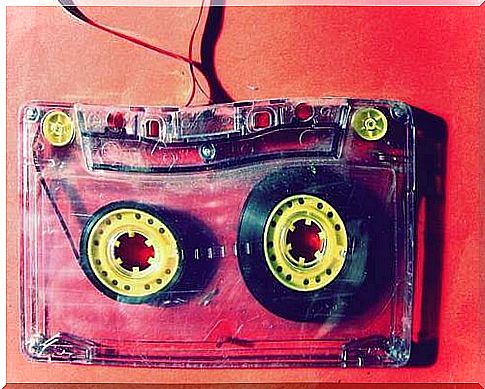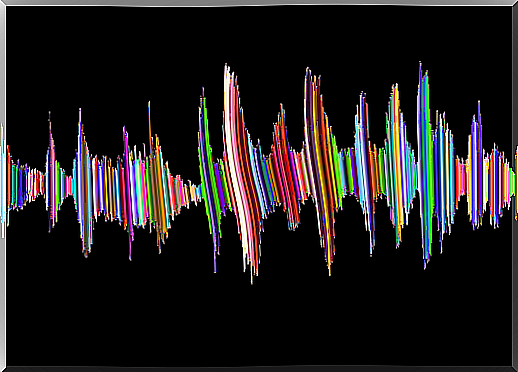Why Does A Song Stick In Our Heads?

When a song stays in our heads, we have the feeling of being in an infinite circle. It doesn’t go away, it doesn’t go out, it pops up again and again with an insistent echo that grabs us with its melody, lyrics and rhythm.
Sometimes his presence can seem pleasant to us. But it gets frustrating when it comes to a trendy song we don’t like, Christmas carols, or music we heard at the mall.
We know that the brain houses its mysteries. Let’s face it though, some puzzles intrigue us, and even more so when we experience phenomena that are beyond our control. We know, for example, that 98% of people have already experienced this sensation. However, as a study by the University of British Columbia indicates, in 15% of cases, this phenomenon can be particularly intrusive and annoying.
We then enter the domain of obsessive-compulsive disorder. Music can thus act as something terribly disruptive to the sufferer. However, for the rest, it is never something invalidating. It almost always becomes that anecdote that we share in our conversations with the typical line “ You know I can’t get this song out of my head? “.

Why does a song stick in our heads?
Earworms. This is the term used by psychologists to define this phenomenon. Musical verses generate these melodies of songs which cling to our brain and which we cannot get rid of. Thus, it is often said that this phenomenon often occurs especially with artists such as Lady Gaga, Queen, Abba, Beyoncé, Adele, Coldplay, etc.
Indeed, if we experience “musical verses” with these artists, it is because we often hear their songs. Indeed, any song can stay in our head, any melody or chorus, no matter who is the author.
It is also possible that we suffer from this phenomenon without even listening to a song. Sometimes all it takes is when something reminds us of a particular song and it suddenly takes hold in our minds. In the rest of this article, let’s see what the experts say about it.
The simpler the song, the easier it stays in your mind
Composers and music producers know this well. The simpler and more repetitive the song, the more impact and probability it will have for the audience to remember.
Doctor Kelly Jakubowsky of Durham University has shown in a study that this type of composition is responsible for “musical verses”.
Our mood also has an influence
Musical psychology expert Dr Vicky Williamson explains that it is generally more common to be receptive to this phenomenon when we are feeling stressed and tired. The same is true when we lack sleep or feel homesick.
In a way, it is as if the brain, tired or trapped in a concrete emotional state, is more willing to give rise to repetitive patterns, especially when it receives musical stimuli.

Memory, a detonator
We mentioned it before. It doesn’t always have to be listening to a song in a bar, on our phone, on the radio, or in a store for it to resonate in our minds. Sometimes it is we ourselves who give rise to this phenomenon by remembering words, music, a song from the past.
A detonator can arise in our environment. These shoes with which we made such a trip by car, this ice cream that suddenly reminds us of a moment in our childhood when our grandmother sang a song to us, etc.
The brain likes to remember. We know very well that emotional memory is directly related to musical memory. So much so that these structures are hardly affected by neurodegenerative diseases, such as Alzheimer’s.
How can we stop the phenomenon of musical worms?
Of course, this phenomenon is sometimes very annoying. It is all the more true if the song which remains in our head is ugly, infantile or far from our musical tastes. To successfully break this curse or repetitive mechanism that our brain has arbitrarily started, it is ideal to follow these tips.
- We tell ourselves statements like, “ I’m going to block this song. From now on, it won’t appear in my mind ” no use. The brain acts in the opposite direction of these direct propositions. It’s like saying to us when we suffer from insomnia “ I’m going to fall asleep, I’m going to fall asleep ” so that in the end, it is even more difficult for us to fall into Morpheus’ arms.
- The right approach is to let go, to accept this intrusive song without resisting. This phenomenon ends up gradually weakening by itself
- Another tip is to listen to the entire song once. If concrete choruses pop up in our mind, your best bet is to listen to the full song. In general, the effect then loses its vigor.
Finally, and just as curious as it may seem, neurologists indicate that when a song remains in our heads, the ideal is to chew a piece of chewing gum to reduce its invasion. This movement with the jaw interferes with musical memory. However, this phenomenon often does not last more than 24 hours.









